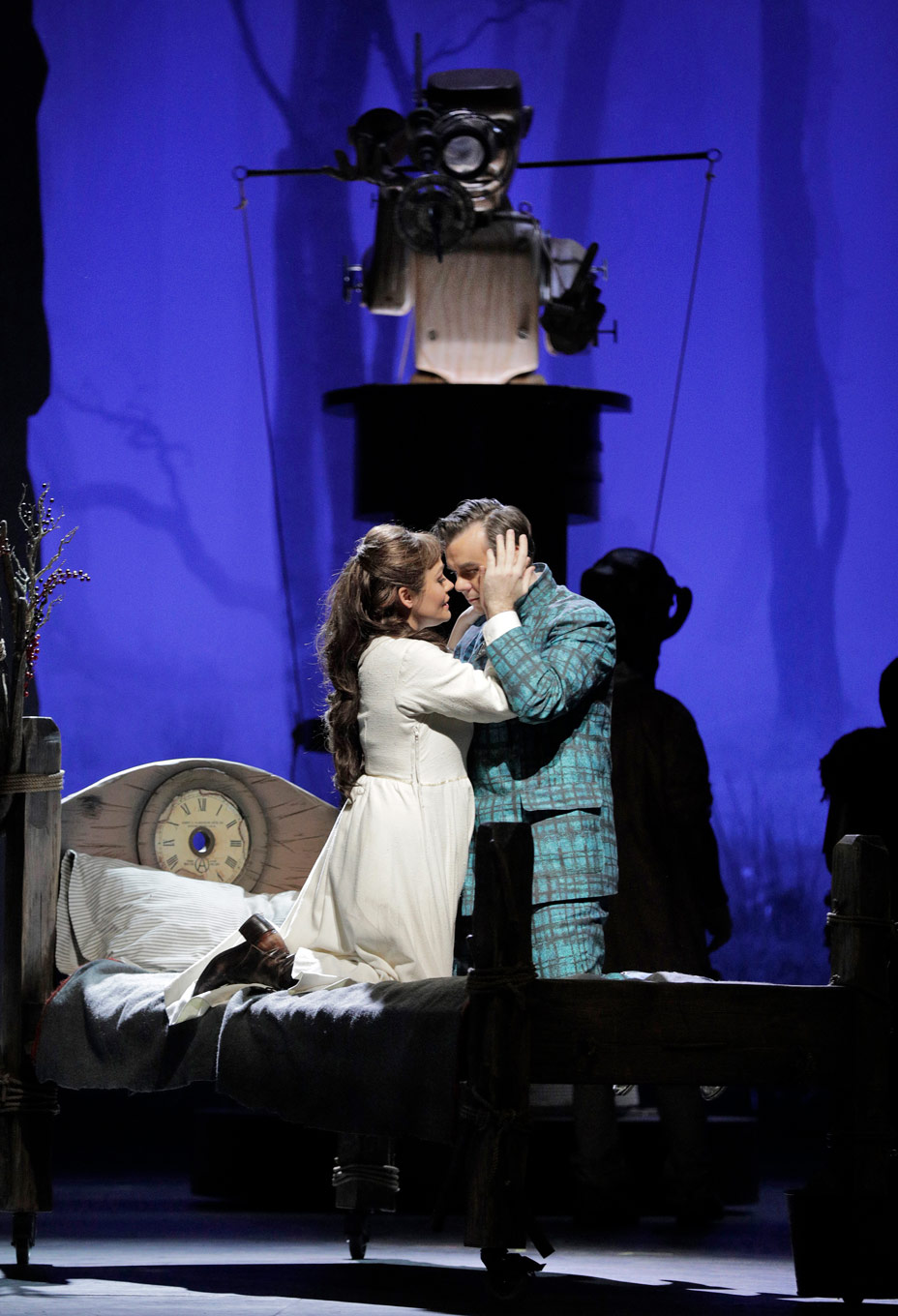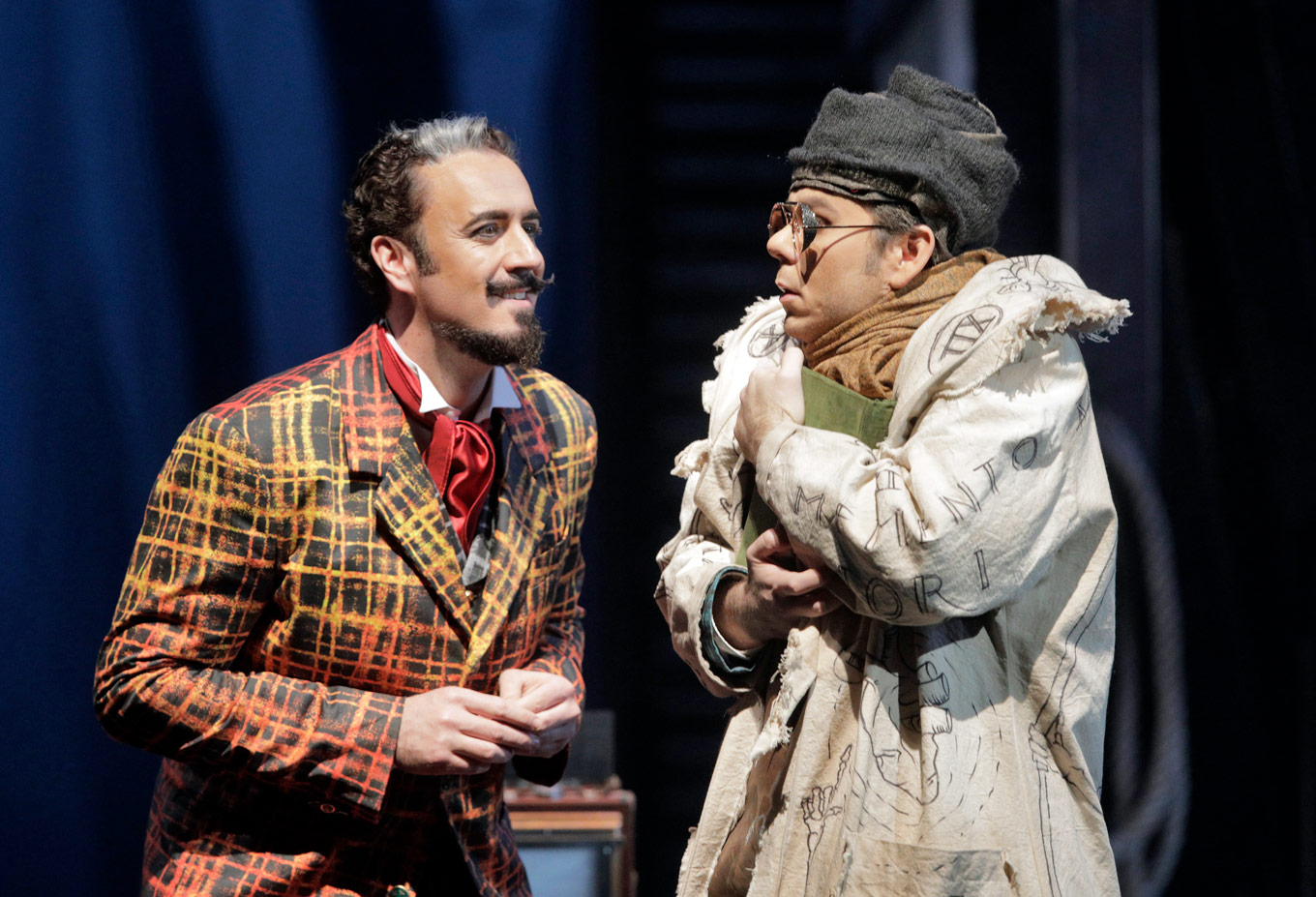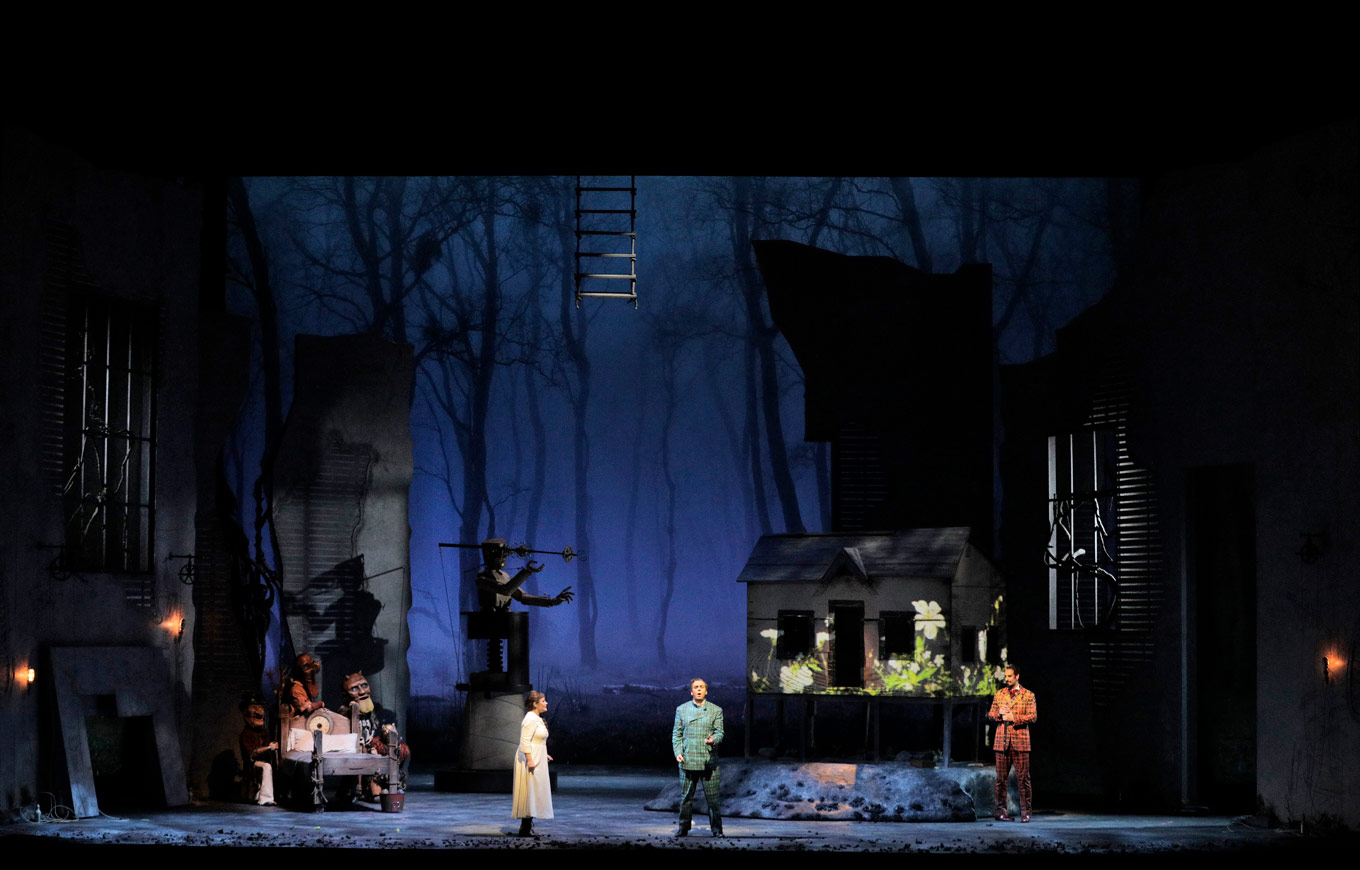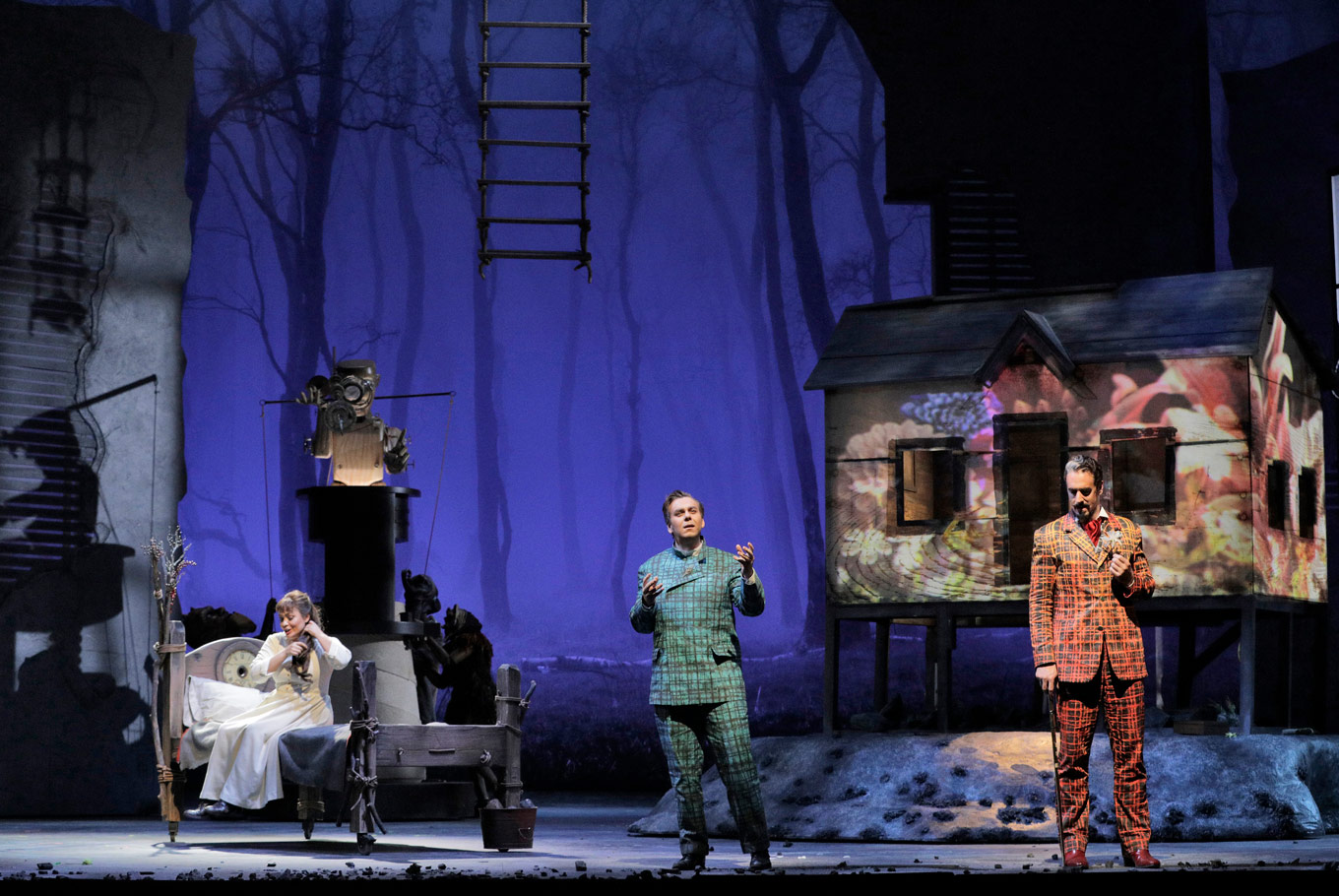
Roundtable: an operatic triple threat
Interview*Lyric Opera of Chicago is currently wrapping up its 2017⁄18 mainstage opera season with an innovative new production of Gounod’s Faust under the direction of Kevin Newbury and maestro Emmanuel Villaume*.
I recently had the pleasure to sit down for a conversation with the production’s three leads: soprano Ailyn Pérez, tenor Benjamin Bernheim, and bass-baritone Christian Van Horn. Van Horn is something of a house favorite, having appeared in fifteen previous productions since 2004. For Pérez, a Chicagoland native, this is a thrilling house debut; and for Bernheim, not only a house debut but his American debut. Though this is the first time they are working together, they’ve developed an easy rapport and a deep mutual respect. Lots of laughter punctuated our shop talk and often the most memorable moments occurred during the singers’ natural repartee. Below is a lightly-edited collection of answers to some of my questions, which I asked over the course of an hour-long conversation. Read on for a bit of insight into these three singers’ lives and work.
Hannah De Priest: Benjamin, this production is a house debut for you, and you’ve made a series of important house and role debuts the past few seasons. When you’re preparing an iconic role like Faust, do you think about fitting into its rich performance tradition? How do you make a role like this personal to you?
Benjamin Bernheim: Well, I grew up with the French opera tradition, so I listened to a lot of versions of *Faust*… live recordings with big names… Two years ago, [I was offered] a Faust in Latvia with [soprano] Marina Rebeka, and I said, “I don’t know, I’m not sure if I should sing that role now,” and two months later comes the offer from Chicago, so I accepted. Faust - like [Romeo &] Juliette, Les contes d’Hoffmann, Manon - is always on my mind but until you have to prepare and sing it, it’s merely latent; it’s there but it’s not yet in the body. So I had all these memories, like how many times have I heard “Salut, demeure chaste et pure”?
Christian Van Horn: You never sang it in audition?
BB: Never! Never ever. It’s what I call a “trap aria.” I find it very dangerous to sing in auditions. So for me, it was time to do my first big French opera and things just came together. In the end, I put the music in my hands and I tried to stay as flexible as possible… I want to be open to anything.

HDP: Who did you all listen to when you were younger? Were there singers you especially listened to in advance of preparing your respective roles for Faust?
CVH: If Nicolai Ghiaurov was on the recording I had to have it, that was early on. Ghiaurov and [Sam] Ramey. As I got older… someone introduced me to Norman Treigle… once I heard Treigle, I thought, “I’ve heard myself.” So I started off with all the appropriate people and ended with the one that fits me the best.
Ailyn Pérez: Especially for Marguerite, I listen to Mirella Freni’s approach. For beauty and technique… I listen to what Joan Sutherland and Anna Moffo brought to it. It’s fascinating to listen to [The Jewel Song] and think, OK, they did it this way because it’s a recording, but they did it this way because it’s live.”
Fortunately, because of the network of singers in the generation we’re in now, I can email Renée Fleming, Anna Netrebko as artists, as singers, as fellow human beings and [they’ll] say, “here’s my opinion, here’s how I did it, good luck, have fun, and in the end, tell the story and be you and fully committed.”
And I still always think to myself, “What would Maria Callas do?”
BB: I think it’s great you can talk with these other sopranos. We don’t have this with tenors!
[laughter]
BB: All these people I had the luck to meet, like Plácido [Domingo], Piotr [Beczała], Jonas [Kaufmann], [Rolando] Villazón. When I was younger, all of these singers fed my imagination… to say in German, my *Vorstellungskraft*… the imagination of the sound. Every time I was listening to these big singers, I was thinking of how I would sound singing this… Now, I feel like I’m on this new level.
CVH: It’s fun when your heroes become your colleagues–
BB: And it’s very weird. I got to sing with Rolando [Villazón] in Zürich, in an opera with two tenors, Il re pastore, and he’s the nicest guy but I thought, it wasn’t two years before that I was at conservatory buying CDs of Villazón thinking, what is it to be him? How does it feel to sing like that? And suddenly, it was like, he’s Villazón but he’s also a normal person.
CVH: We all have humble beginnings.

HDP: How is it going jumping from project to project, making sometimes very big switches between, say, Verdi and Mozart or Verdi and Handel?
CVH: I think when you make these shifts, these are opportunities to re-center your voice. If you spent a whole year singing Verdi, you’re going to sound very different by the end of that year. So I love to have a mix – a little Britten, do some Verdi, French opera, whatever.
HDP: What centers your voice?
CVH: Well, everyone’s supposed to say Mozart and it’s probably true.
BB: If you can sing Mozart!
CVH: True - Mozart can hurt you if you don’t use your technique. A lot of people get in trouble with Mozart. But I re-set with Mozart and Rossini, too, to keep the voice moving.
BB: I discovered at the Vienna Staatsoper that Nemorino might be my centering role. It’s great exercise. And I remember when I worked with [Carlo] Bergonzi some years ago, he told me he tried to keep Nemorino in his schedule every year to keep the voice smiling and fresh.
AP: I like French music, that’s what centers my voice… with French music, in a dramatic scene, you give [dramatically] but you always have to give it in a beautiful way. You can’t be so heavy in the end [of a line], even where there’s a high note. There’s more bloom and youthfulness in the aesthetic in French music, and that’s why I am keeping these ladies Juliette, Marguerite, Manon and Thaïs in the core of my repertoire.
BB: Is it something to do with the language too?
AP: Yes! I wanted to say, working with you [Ben] has been very–
BB: Traumatizing?
AP: Fun! Not to say that French are the only people who can sing French, we all need help with the prosody and how to shape the phrases, but with the r’s and the way you set up the flow of your voice… When we sing [French] it’s all about air flow and vowels and maximum resonance and projection and drama and emotions – everything all at the same time!
BB: In French, it’s very–
AP: It’s couture!

At the end of our time together, I put Ailyn, Benjamin, and Christian on the spot to answer some “rapid-fire questions”:
HDP: What was your first role ever ever?
AP: I was the small role of Nancy in the telephone hour in Bye Bye Birdie.
BB: My first role ever was one of three kids in *Zauberflöte*… in an amateur production.
CVH: I sang Prince Charming in Rodgers and Hammerstein’s Cinderella.
BB: … At three years old. [laughter]
HDP: What is the work/role that’s at the top of your bucket list right now?
CVH: Philip in Don Carlo.
BB: Hoffmann.
AP: I want a new production of Rusalka with the ending I want! The ending she deserves - she needs to be a phoenix at the end!
HDP: What’s a role that makes you wish you could temporarily change your voice type to sing?
CVH: Cavaradossi [from Tosca].
BB: It’s not only the role, I would like to be [Piero] Cappuccilli singing [Verdi’s] Boccanegra.
AP: I would want to be you, [Christian,] I would want to be the devil.
HDP: What’s your favorite thing about Chicago?
AP: Honestly, my family is here, that’s the best part. The architecture too, growing up here - it’s man-made landscape…. I’m fascinated by it.
BB: I’m a huge Batman fan, so being here, walking around, I am there! Everything reminds me of these [Christopher Nolan] movies.
CVH: My favorite part of Chicago and it’s only certain places, is this overwhelming smell of brownies that hits you downtown. It’s a couple times a day, when they start mixing the cocoa or something and this brownie smell hits you. [Note: Christian, I’ve been advised that the confectioner you’re thinking of is the Blommer Chocolate Factory, a Chicago institution since 1939!]
Over the course of the interview, the convivial energy between the three singers became more and more apparent. It was touching to see how these professionals have clearly bonded over the course of their residency in Chicago for this production.
CVH: Honestly, I’m ready to sign right now, that I work with these two forever. It’s amazing.
BB: Maybe in ten years, we will find each other again and we will do another production of Faust and we will still be Van Horn, Pérez, and Bernheim but it will be new - a version of us ten years older.
AP: Awww! I want that! I want to do that!
CVH: I think we could do it. Let’s do it. Someone would agree to that right now.
HDP: The reunion tour!
[laughter]

Great opera houses, take note. Until then, if you’re in Chicago, race to the Lyric to catch these three in the final performances of Gounod’s Faust!
N.B. soprano Ana Maria Martinez will sing the role of Marguerite for the final performance of Faust on March 21st.


Comments